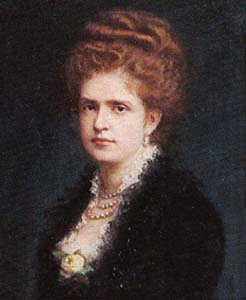<Back to Index>
- Physicist Charles Thomson Rees Wilson, 1869
- Poet Kostas Varnalis, 1884
- Queen Consort of Portugal Maria Pia of Savoy, 1847

Maria Pia of Savoy (14 February 1847 - 5 July 1911) was a Portuguese Queen consort, spouse of King Luís I of Portugal. She was the daughter of Victor Emmanuel II the first King of Italy by his first cousin Queen consort Adelaide of Austria. On the day of her baptism, Pope Pius IX, her godfather, gave her a Golden Rose. Maria was married to Luís I of Portugal on the 6 October 1862 in Lisbon.
As a queen, Maria Pia became known both for her extravagance and for her charity. She had a taste for luxury, parties, balls, fashion and masquerades; at a masquerade ball in 1865, she changed costume three times. When the Portuguese parliament discussed the queen's excessive expenses, Maria Pia replied saying "if you want a queen, you have to pay for her".
Maria Pia of Savoy was also known in Portugal as "angel of charity" or "mother of the poor" for her compassion and work on social causes.
She did not get involved in politics, but at a conflict with João Carlos Saldanha de Oliveira Daun, 1st Duke of Saldanha in 1870, she stated: "If I were the king, I would have him shot!" Luís died on 19 October 1889 and Maria Pia became Queen Dowager.
She was very active as such and continued with her social projects and
held a dominationg position at court. She served as regent during the
absence of the king and queen. The Queen Dowager was devastated after the assassination of her son, King Carlos I of Portugal and grandson Luís Filipe, Duke of Braganza on 1 February 1908. During her last years in Portugal, she was showing signs of senility, and was rarely seen in public. She was deeply upset by the deposition of her other grandson Manuel II of Portugal by the 5 October 1910 revolution and the resulting establishment of the Portuguese First Republic. Maria Pia left Portugal with the rest of the royal family to exile in 1910. She returned to her native Italy, where she died on 5 July 1911. She is said to have mourned the loss of Portugal. Her remains are interred in the royal mausoleum in the Basilica of Superga, near Turin with most members of the House of Savoy since the 18th century.